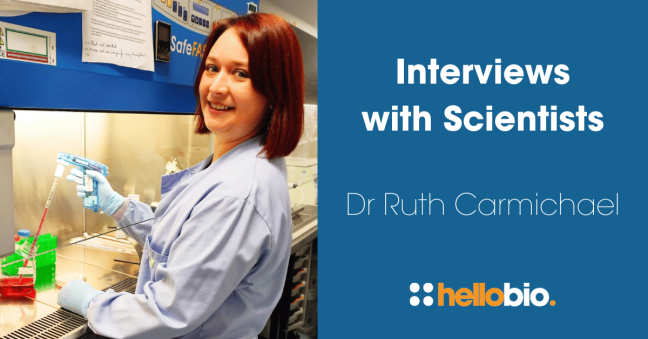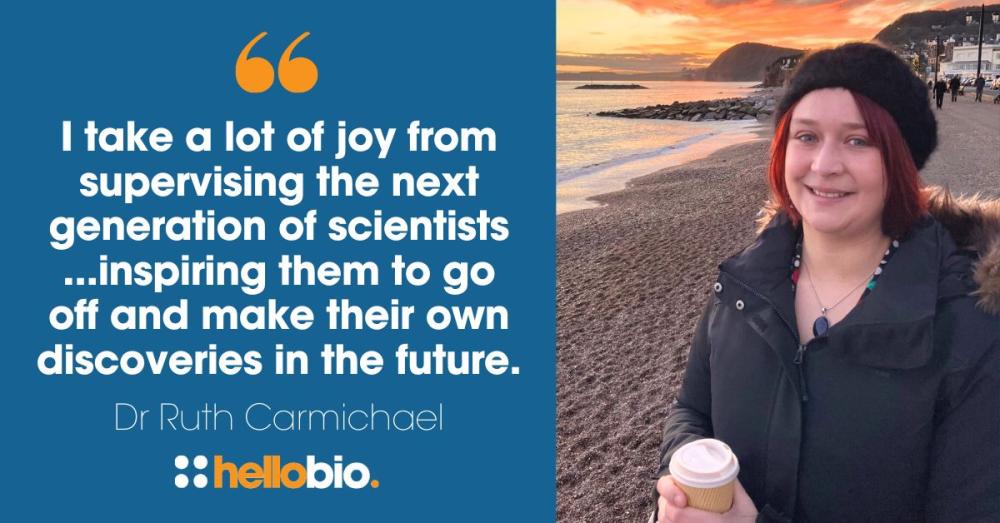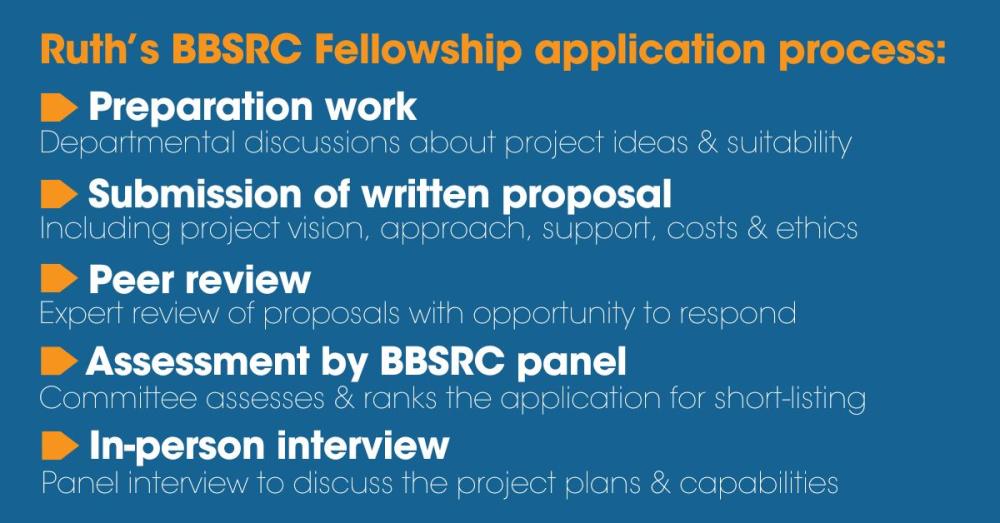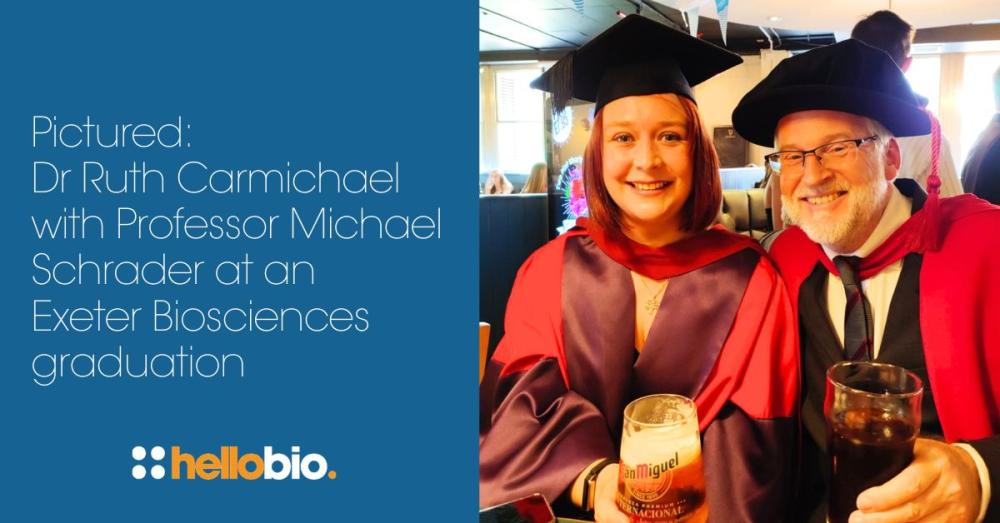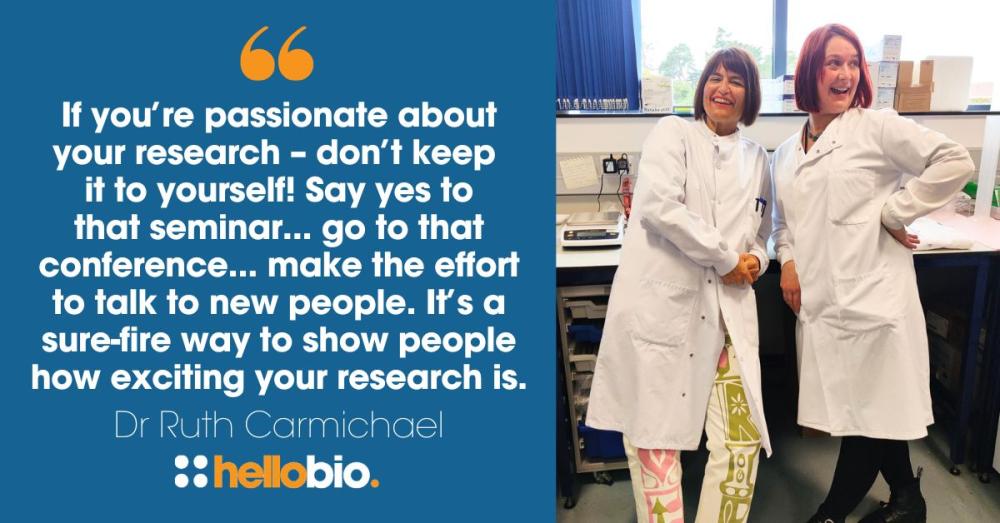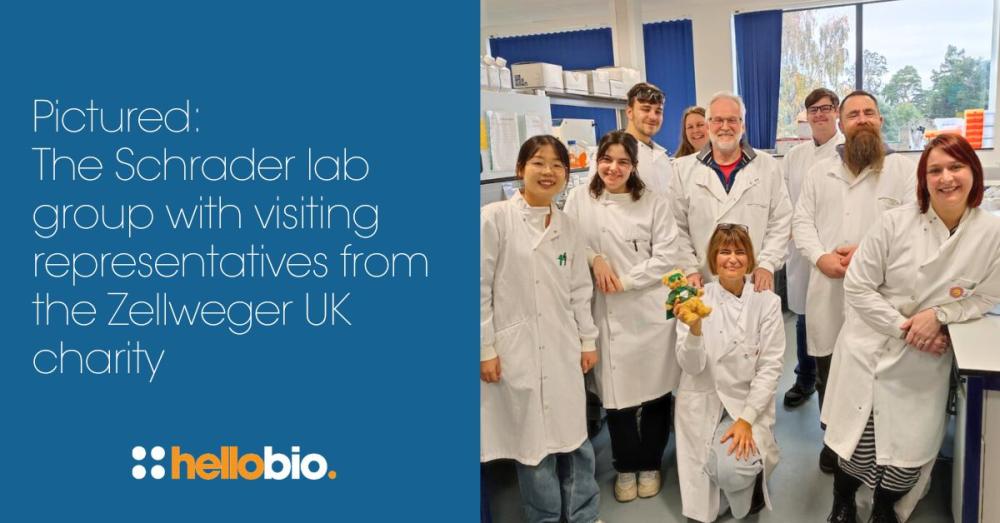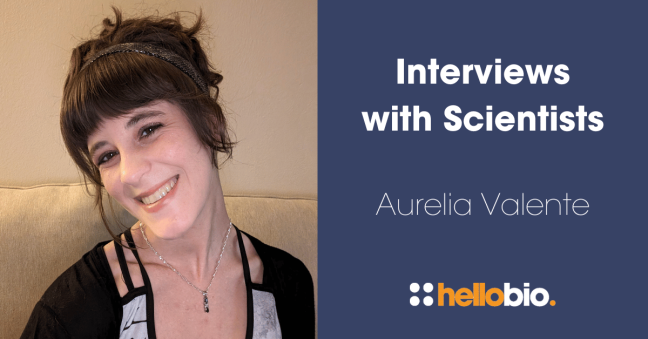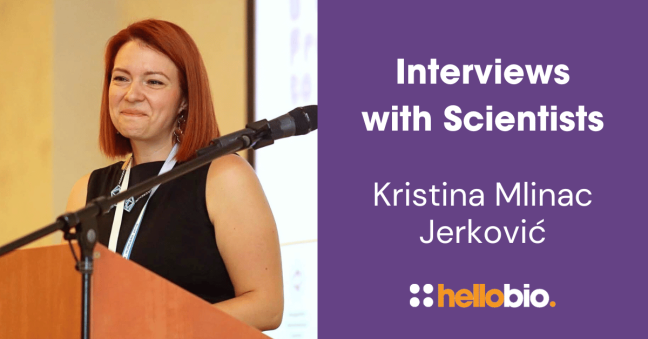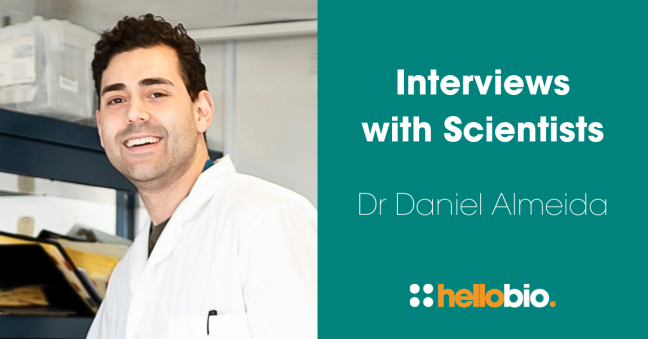Interviews with Scientists: Dr Ruth Carmichael
It’s time for another installment of our Interviews with Scientists series, and this week we were delighted to chat with Dr Ruth Carmichael! Ruth is a molecular cell biologist who was recently awarded a 3-year BBSRC Discovery Fellowship to establish her own independent research into organelle communication in neuronal cells at the University of Exeter.
Ruth Carmichael completed an MSci degree in Biochemistry at the University of Cambridge, before carrying out a four-year BBSRC-funded PhD in the lab of Professor Jeremy Henley at the University of Bristol, studying molecular neuroscience. She then completed two short postdoc positions at the University of the West of England and University of Bristol, before joining the University of Exeter in 2018 as a postdoc in the lab of Professor Michael Schrader, looking at organelle dynamics and interactions, with a particular focus on peroxisomes.
In this fascinating interview, we were excited to find out more about her career so far, her Fellowship award and the application process she went through to receive it. She also shares valuable advice for those applying for similar opportunities, and discusses the importance of putting yourself and your research out into the world, even if it means stepping out of your comfort zone!
Hi Ruth! Please can you tell us a little bit about your current role at the University of Exeter?
I am a Research Fellow in the Department of Biosciences at the University of Exeter, having recently started my first independent Fellowship. I’m a molecular cell biologist who is interested in how the different organelle compartments in our cells communicate and cooperate with each other, in order to coordinate their functions and keep cells healthy. In particular, I focus on two metabolic organelles, peroxisomes and mitochondria, that share a number of functions in lipid metabolism and redox homeostasis, and are especially crucial in the brain. My research aims to find out how and why peroxisomes and mitochondria communicate with each other in neuronal cells, and whether improving this communication could be beneficial for neuronal health. Mostly I’m therefore in the lab doing experiments (involving cell culture, microscopy, molecular biology and biochemistry), as well as carrying out the associated research admin. I also help to supervise PhD, Master’s and undergraduate students in the lab, and do a bit of teaching on undergraduate cell biology courses too.
What was the focus of your PhD research?
I carried out my PhD research at the University of Bristol, which is where my passion for molecular neuroscience began. I was investigating how delivery of neurotransmitter receptors to and from the surface of synapses is regulated, which is important for learning and memory processes in vivo. After my PhD, I returned to the same lab to work on a Parkinson’s UK-funded project looking at (dys)regulation of mitochondrial dynamics in neurons, which really ignited my interest in organelle function in neuronal health.
Did you always want to work in science when you were younger, and if so why?
Oh, 100%. I was always very curious as a child, constantly trying to figure out how things worked. I think it frustrated my parents, as there could never be any magic or mystery in the world – everything had to have a logical explanation! Biology and Chemistry were my favourite subjects at school, so when I was 16 I arranged a work experience placement in a molecular biology lab (by coincidence, in my current department at Exeter!), and was immediately hooked.
What excites you most about the work that you do?
It’s probably the same answer that all scientists would give: discovering new things! Working at the frontiers of human knowledge is very exciting – even a seemingly minor observation can be cool, because chances are no-one has noticed that thing before. I particularly like that we’re still figuring out how our own cells work, which is not just interesting at the fundamental level, but is also important from a biomedical perspective and may one day improve people’s lives. While I really like getting hands-on in a lab, I also take a lot of joy from supervising the next generation of scientists, hopefully inspiring them to go off and make their own discoveries in the future.
You were recently awarded a Discovery Fellowship from BBSRC. What does this award mean to you and how will it benefit your research?
It’s a huge honour, as it’s the first research funding that has been awarded to me personally as the Principal Investigator, which is very gratifying. It gives me the time and money, that I wouldn’t have otherwise, to carry out this research project that I am really passionate about, allowing me to combine my background in molecular neuroscience with my experience in organelle communication for the first time. It’s going to be a big step forward in my career as I can start establishing myself as an independent scientist and developing my own research niche. It will also give me the opportunity to travel to build collaborations with my international Project Partners in academia and industry, taking advantage of their expertise and technologies to drive the research forward.
What did the grant application process entail?
For me, it started with a lot of internal discussions within my host department (I chose to stay at the University of Exeter), to make sure I was in a strong position to apply, considering my track record, career stage and project ideas. Then, I submitted my written proposal – I needed to explain my ‘vision’ for the project (what the big picture was and why it was so important) and the technical approach for achieving my aims. Since Fellowships, more so than standard grants, are investments into individuals, I also had to make it clear why I was the best person to carry out this project, and how it would develop my independent career. The proposal was then peer-reviewed by experts in the field, and I had the opportunity to respond to their comments. Following that, the applications were assessed by a BBSRC panel, and I was shortlisted for an in-person interview, where I was questioned about my project, my future plans and my capability to deliver the work. That was probably the scariest experience of my life, but luckily it had a positive outcome!
What advice would you give to others applying for similar fellowships?
During the process, seek plenty of advice and feedback, particularly from people who are not within your research area (as the assessment panel are unlikely to be). But, importantly, don’t feel like you need to heed all this advice: you’ll get lots of invaluable nuggets, but if something doesn’t sound right to you, have the courage to disagree!
Women remain underrepresented in many fields of STEM. What more do you think could be done to improve the gender balance in science?
From what I’ve seen, I think the PhD to postdoc transition is where a lot of talented women are lost from STEM. There’s lots of evidence that women are more likely to suffer from imposter syndrome than men. PhDs are particularly gruelling in that respect – you face lots of challenges and disappointments – so more mentoring for women at this stage to build confidence and resilience is important. Since I’ve been in science, career opportunities for women seem to be improving (though they could still be better), with more female junior group leaders as role models and a move from funders to embrace more diverse career paths, so I think female PhD students need more support to recognise that a career in science doesn’t mean giving up your whole life any more.
Who has been the most influential mentor in your career so far?
This is a tricky one, because I’ve been lucky enough to have a string of great mentors at every stage of my career so far. But the one who has probably been most instrumental in getting me to where I am now is my most recent postdoc supervisor (and host for my Fellowship), Prof. Michael Schrader. He has really given me the opportunity to develop my independence and take on more responsibility, and taught me so much about the realities of how to run a lab group. He has shown me the importance of building a happy and productive team with a good work-life balance. And his passion for peroxisomes really is infectious!
What's the most valuable piece of career advice you’ve ever been given?
If you’re passionate about your research – don’t keep it to yourself! It might be scary and outside your comfort zone, but say yes to that invitation to give a seminar, or go to that conference and make the effort to talk to new people. Not only does it raise your profile, but it’s also a sure-fire way to show people how important and exciting your research is. You might get some great new ideas or collaborations out of it too!
How do you see your career progressing in the future/where do you see yourself in 10 years?
Hopefully I will be able to grow my research team, in order to work towards my vision of elucidating the roles of organelle communication in the brain more broadly. As well as the fundamental molecular cell biology, I would like to start translating my findings into more biomedical applications, once the proof-of-principle is established. Since I enjoy teaching alongside my research, I would be aiming for a position in an academic institution that would allow me to do both.
Outside of your career, what do you enjoy doing most? (e.g. hobbies, passion projects, etc.)
I have been dancing since I was 4 years old, and still attend weekly classes as a great way to get fit and have fun. I also enjoy cooking, and as a real ale enthusiast can often be found seeking out new beers to try!
What do you think is the greatest scientific discovery of all time?
For my research field, I don’t think we would be where we are now without PCR (polymerase chain reaction) for amplifying DNA sequences. It has accelerated our ability to identify and functionally characterise proteins encoded by different genomes and generate synthetic tools via cloning. It has also revolutionised our ability to quantify gene expression and driven advances in genome sequencing. It’s an essential technique for my research that I do almost every week, in order to be able to express proteins and mutants in cells to determine their localisation and function – life would be much harder without it!
What’s your favourite science joke?
What’s a biologist’s favourite drink? A gene and tonic!
And finally, are there any other specific issues or initiatives in science that you are involved with or are passionate about?
I’d like to give a shout-out to Zellweger UK, a fantastic charity that supports patients suffering from peroxisome biogenesis disorders and their families. They do amazing work and have always been really supportive and engaged with our research.
_________________________________________________
Thanks for such an fascinating interview Ruth! We look forward to following your career and research work as it progresses.
Connect with Ruth:
- LinkedIn: Ruth Carmichael
- X (Twitter): Ruth Carmichael
- Profile: https://experts.exeter.ac.uk/28508-ruth-carmichael
- Schrader Lab: https://schraderlab.weebly.com/
_________________________________________________
If you enjoyed this article, why not check out the other resources available on our blog. We are passionate about supporting life scientists including early career life scientists and PhD students - with really low-priced reagents, antibodies and biochemicals, early career scientist grants, and resources to help with both personal and professional development. We know how tough it is - so we hope you find these helpful!
More General Support for Life Scientists
For advice on wellbeing, dissertations, presenting at conferences, wellbeing, PhD support, networking and lots more, we have a huge range of articles to help - just click below:
Save up to 50% on our high purity reagents...
When you get to the stage of planning your experiments, don't forget that we offer a range of low-cost, high-purity agonists, antagonists, inhibitors, activators, antibodies and fluorescent tools (yes - they really are around half the price of other suppliers!) You can use our Quick Multi-Search Tool to search for lots of products in one go, and the range includes:
- Enzyme inhibitors and activators
- Chemogenetic ligands
- Ion channel modulators
- GPCR & ionotropic receptor ligands
- Cell biology reagents & biochemicals
Technical resources
Try our Molarity Calculator: a quick and easy way to calculate the mass, volume or concentration required for making a solution.
Try our Dilution Calculator: an easy way to work out how to dilute stock solutions of known concentrations
We also offer a comprehensive range of technical resources including antibody protocols and methods, product guides and mini-reviews:
And finally, don't forget to check back in with our blog regularly for our latest articles. If there’s something you’d love to contribute to the community, whether that’s an interview or article, drop us a line at hello@hellobio.com
---





